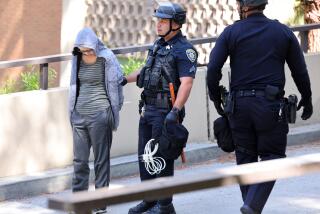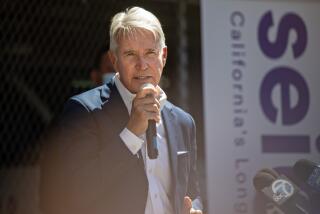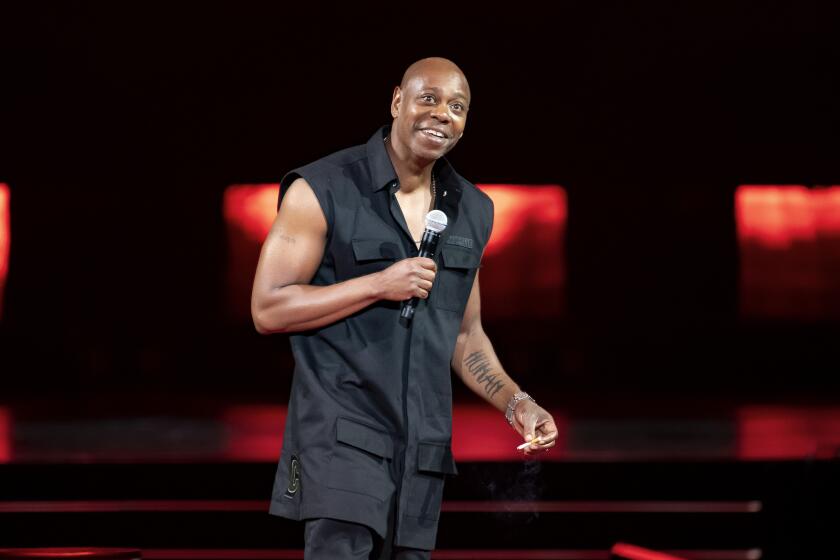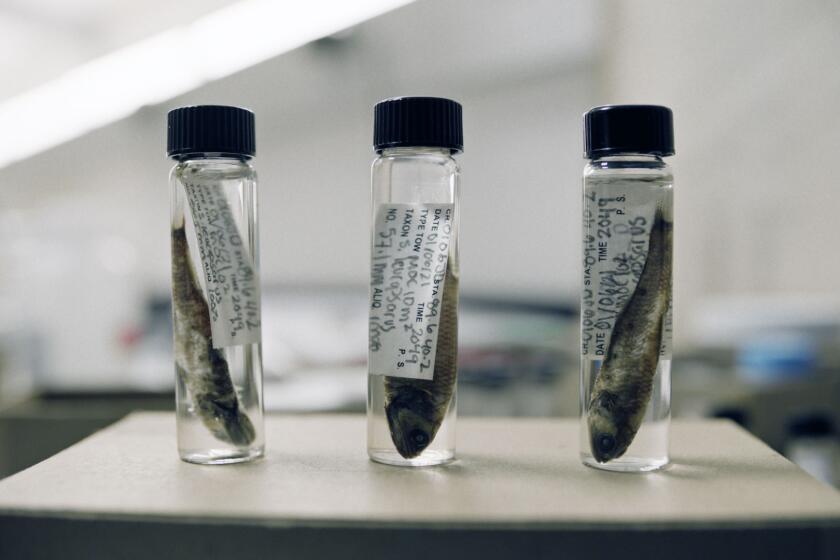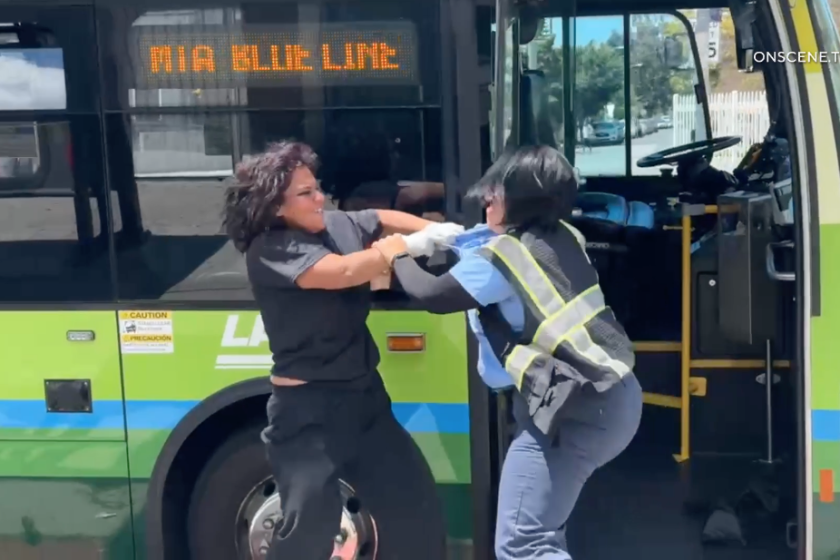COLUMN ONE : How Deal With Gates Was Struck : Councilmen Ferraro and Wachs sought a graceful way for the chief to step aside. The agreement they reached came after a long day of negotiations on the telephone.
From the moment they left their homes at the outset of their momentous day until the last triumphant phone call at dusk, Councilmen John Ferraro and Joel Wachs knew they could persuade Los Angeles Police Chief Daryl F. Gates to retire only if they could find a graceful way for him to leave.
“We wanted to find a way for him to retire with some dignity,” Ferraro said. Said Wachs: “The last thing he wanted was to be kicked out.”
Diplomacy, political sense and an understanding of the chief’s volatile psyche guided the two politicians as they crafted an agreement as ambiguous as a Middle East peace treaty--broad enough to allow the chief to call himself master of his own destiny, but still allowing Ferraro to say:
“There wasn’t any doubt in my mind or Joel’s mind that he was going to announce his retirement.”
Just when he will announce it, of course, is unknown, the ambiguous part of the agreement, the aspect that gives the canny Gates the leverage to make sure that this extraordinary chapter of Los Angeles history--which began with the March 3 police beating of Rodney G. King--is nowhere near its conclusion.
Ferraro, a 24-year council veteran, and Wachs, who has served 20 years, are convinced they have a deal.
“I think we found an answer,” a relieved and happy Wachs told his chief aide, Greg Nelson, Thursday evening.
It was a potential departure point, not only for Gates, but for sections of the City Charter born amid another scandal--the disgrace of Mayor Frank Shaw, thrown out by recall in 1938 amid charges of corruption. The Christopher Commission concluded earlier this week that those Charter sections not only are outdated, but have contributed to a paralysis in city government when it comes to managing the Police Department.
Getting to that point Thursday involved a day of delicate negotiations with the proud chief, a man sensitive to slights and determined to stick around long enough to play a major role in reshaping his battered department. By linking Gates’ retirement to a special election on Charter reform, they gave him claim to that role.
It was a day of telephone negotiations, ending at sunset, with Wachs and Ferraro on the phone in Ferraro’s office with Gates, offering the proposal that the chief accepted--a special election in the late fall on the Christopher Commission’s reform recommendations, including a term limit for the new chief. With that, Gates agreed to let the retirement process begin.
The action took place in Ferraro’s office on the mezzanine of City Hall, in a suite filled with mementos of a career in athletics and politics.
There is a picture of Ferraro, the football All-American, in his early ‘40s USC uniform; Ferraro the pol, with Frank Sinatra and John F. Kennedy. A Rams football helmet sits on a coffee table. Olympics pins from 1984 are displayed on shelves. This is the office of a man whose life revolves around sports, politics--and his wife, Margaret, whose picture occupies a large space on a table near his desk.
He and Wachs would seem to have little in common.
While Ferraro, 57, studies the sports pages, Wachs, 52, is catching up on news of museums, the Music Center and other Los Angeles culture spots. Owner of an extensive art collection, Wachs is the council’s greatest supporter of the arts.
They once were bitter foes. In the late 1970s, Wachs unseated Ferraro as council president in a move so murderously swift that The Times’ midafternoon edition headline screamed “City Hall Coup.” Ferraro nourished his bitterness, and a year or so later organized a coup against Wachs, collecting enough votes to replace him with City Councilwoman Pat Russell.
Eventually Ferraro regained his old post. In recent years, these veteran pols have found ways to work together.
One other thing they have in common proved crucial this day: they are both among the few members of the council whom Gates, scornful of politicians, trusts. As a friend of Gates said: “Joel sometimes can be an antagonist, but he is looked upon by the chief as a fair-minded man who can reason with council members who won’t even talk to the chief. And John is the leader, the president, plus he is good friends with the chief.”
For months, Wachs recalled Friday, he has been talking long and hard to Gates about the need for the Police Department to change its image. “We’ve talked about that a lot,” he said, “about how there hasn’t been a commitment on how you treat people (that is) as great as the (department’s) commitment on being incorruptible.”
Thursday’s events began with Wachs and Ferraro reaching the same conclusion on their separate morning drives to work.
As Wachs drove in from his hillside San Fernando Valley home, he knew the firestorm at City Hall was out of control. Mayor Tom Bradley and the council were deadlocked over the future of Gates and the Police Department. No other city business was getting done. Tourism, crucial to Los Angeles’ economy, was slipping as a result of the King beating. Gates had taken command of the crucial Internal Affairs Division away from Assistant Chief David Dotson in the wake of disclosures that he had frankly criticized the chief in testimony before the Christopher Commission. Gates’ move triggered charges of retaliation.
Meanwhile, the ranks of those who could offer a solution had thinned.
Bradley had removed himself as a potential peacemaker because he supported his Police Commission’s abortive attempt to put Gates on leave. That maneuver also put the commission out of the picture, unable to fulfill its City Charter role as supervisor of the Police Department.
After taking the elevator up to his mezzanine-level City Hall office, Wachs greeted his chief aide, Nelson. “This can’t go on this way,” he said. “You have any ideas?” Nelson went off to a quiet place in the office and tried to think of something.
Ferraro drove in from his home in Hancock Park, the elegant old neighborhood in mid-Wilshire, and went up to his office, down the long hallway from Wachs’.
He, too, was ready to act. Like Wachs, Ferraro had been criticized by civil rights groups for refusing to criticize Gates. In fact, he strongly defended the chief. But he had been impressed by the Christopher Commission Report and was an old friend of the chairman, Warren Christopher.
“A couple of members had urged me to do something,” Ferraro said. “I knew I was in the best position to do something because of my long, strong relationship with Daryl Gates. I’ve been consistently for him, unlike some of my colleagues.”
Looking for a solution, Wachs walked down the hall to Ferraro’s office. Ferraro, the council president, was pivotal in putting together any plan. Like Wachs, he could communicate with Gates. But their first talk was inconclusive.
The political problem was daunting.
The Christopher Commission Report had proposed the outline of a solution. In one of its most crafty recommendations, the report suggested that Gates remain in office until his successor was chosen, presiding over the beginning of the transition. That opened the door to the possibility of a graceful exit by Gates.
But the commission also recommended extensive Charter changes, and these could not be enacted until they were approved by the voters at the next election, and that wasn’t until June, 1992. Months of potential turmoil loomed.
Alone in his office, Ferraro telephoned the 64-year-old Gates. “We had a nice, long conversation,” Ferraro said. “There was no doubt he wanted to retire in the near future. Then he talked about the process. He didn’t want an interim chief. He said he wanted the measures (the Christopher Commission proposals) to run their course” in an election.
That was encouraging, but not a solution.
By now, it was afternoon. Ferraro figured he’d better let some others know what he was doing.
He called his friend Christopher and offered to drive to the attorney’s downtown office to brief him. No, said Christopher. He insisted on driving to City Hall. They talked in Ferraro’s office.
Then Ferraro briefed the mayor. These two old political pros have had a stormy relationship, but still maintain the old-fashioned civility required to keep the wheels of government rolling. Bradley often walks up the mezzanine to talk to Ferraro. This time, Ferraro visited him.
The mayor sat at his favorite chair next to a coffee table in his large, formal office where he receives guests. Ferraro was on a couch on another side of the table. He told the mayor what he and Wachs were doing. Bradley, he said, listened stone-faced, saying little. He urged Ferraro to go ahead.
Go ahead with what? He and Wachs now knew the chief wanted to retire. But only after an election on the Christopher reforms.
By now it was after 5 p.m. Time was running out. Gates was scheduled to fly to North Carolina to address a national meeting of the DARE anti-drug organization he had founded. “The chief had to catch an early evening plane,” a friend said. “This all had to be put together, packaged and presented before then.”
Ferraro called Wachs. Nobody answered. Most of the office staff had gone home. But Ferraro knew Wachs was in the office. His assistant, Tom LaBonge, hammered on Wachs’ door. Wachs appeared.
Wachs and Ferraro gloomily looked at an election calendar Ferraro had obtained. No doubt about it, June was too far away.
But an idea had been circulating around City Hall, a special election on the Christopher proposals in the Fall. It was just a tentative idea, something discussed in corridors and offices.
Wachs mentioned it to Ferraro, somewhat tentatively. But as soon as he spoke the words “special election,” the solution came together in Wachs’ mind. “That’s it,” he told Ferraro.
Recounting the moment later, Wachs said “the special made the other things work, it keeps the process from dragging out.” A special election would cost more than holding the election in June, but at that moment, Wachs said, “money was irrelevant; if you could bring about peace, it is worth the money.”
Ferraro called Gates. “We told him we thought there should be a special election, the election could take place before the end of the year. He thought that was a good idea.”
Wachs filled in more details.
He said he told Gates that the process included picking a successor to the chief. “He agreed,” Wachs said.
Ferraro called Christopher, who said he was pleased.
Signed, sealed and delivered. Almost.
At 7 a.m. Friday, Ferraro’s phone rang at home.
It was the chief, calling from North Carolina. Reporters were bugging him about him quitting, prompted by a report in The Times outlining the chief’s willingness to retire.
What’s going on? the chief asked.
Ferraro said that he and Wachs were going to announce the special election at a news conference in a couple of hours.
Fine, said Gates. Just don’t announce my retirement.
At the news conference, Ferraro announced the special election plan, but tried to deflect questions about Gates’ departure. The chief would address that himself, Ferraro said. Wachs, though, was forthright: Gates had agreed to “pass the mantle to the new chief.”
More to Read
Start your day right
Sign up for Essential California for news, features and recommendations from the L.A. Times and beyond in your inbox six days a week.
You may occasionally receive promotional content from the Los Angeles Times.
